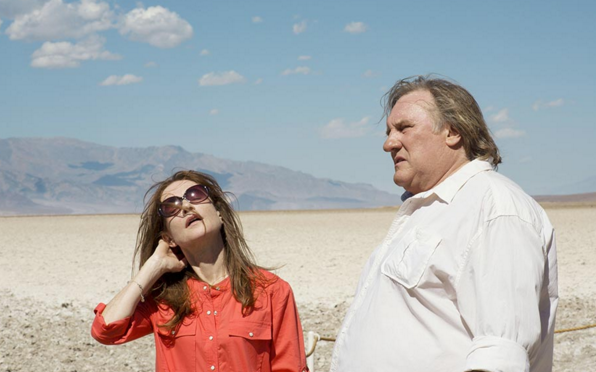You can’t really hate an ex if you once loved him. At least, that’s the conclusion we’re led to by Isabelle (Isabelle Huppert) in Guillaume Nicloux’s often meta, often disturbing Valley of Love. A unique narrative that explores the possibilities of redemption in life and in death, Nicloux offers something extremely rare in twenty-first century filmmaking: an original concept.
Like the very stagnation that characterizes Death Valley, Nicloux eases us in slowly to the characters of Isabelle and Gérard (Depardieu), taking his time in establishing the surreal rules of this cinematic world, one where their son, Michael, writes them letters from beyond the grave and tells them that it will be possible to see him again–only briefly–if they follow his instructions precisely.
Of course, after decades of being divorced and having started separate lives and families of their own, coming together for this purpose is more than a tall order for Isabelle and Gérard, the former of which is far more receptive to the possibility that this could be real, that Michael will appear to them. And, in spite of being overtly annoyed by American culture, particularly the type of people in her age bracket who ask her obvious questions, like, “Are you French?”, it seems as though Isabelle comes around to the strange beauty of Death Valley, a hit-you-over-the-head sort of backdrop, but effective nonetheless.
Gérard, on the other hand, is submitted to no end of vexation, not just from the heat, but from other Americans as well, like a fellow hotel guest who recognizes that he’s been in some movies, but can’t name any–he still asks for his autograph, to which Gérard playfully responds to by writing his name as “DeNiro.” Later, this will come back to haunt him (haunting is the grand motif of Valley of Love) when the man finds him at the hotel bar with Isabelle and starts ranting about his inconsiderate nature and that “his wife” should be ashamed. Isabelle, for the umpteenth time, tells Gérard to “please tell him I’m not your wife.”
The casual contempt the two share for one another is, indeed, indicative of the passion that once burned inside of them when they were together. But sometimes, the flicker of desire for someone you’ve shared too much with goes out altogether, and the relationship is forced to transcend into something else in order to survive. Considering that the original reason for it to thrive was on behalf of their son, it only makes sense that it would further deteriorate in the wake of his suicide. His apparent refusal to even talk to either of them for a seven-year period added further stress to the rapport between Isabelle and Gérard–and it is a stress that continues to mount when Gérard insists that, yes, they failed as parents.
While Isabelle has children in her new marriage, Gérard has seemed to remain a giant baby who still needs a woman to take care of him. And then perhaps, he didn’t want to fail yet again at the whole parenting scene. As they travel from one landmark to another–per Michael’s specific itinerary–they each become more confessional with one another. Isabelle admits she knows very little about her daughter beyond a surface level, suggesting that one of Nicloux’s primary themes is that you can have a “do-over” as many times as you want when it comes to having children, but ultimately, a barrier always arises between parent and child. It is the natural course of life. Those who give us life are also responsible for subjecting us to an inevitable death, and we end up resenting the shit out of them for it.
Gérard, meanwhile, has a confession of his own that changes how Isabelle treats him, and a walk through one of the final landmarks brings to light new revelations that expound upon a previously eerie scene during which an otherworldly-looking girl stands in a tennis court and tells Depardieu that “It’s too hard.” It is in this instance that Nicloux can’t resist a bit of Lynchian creepiness. But then, a love story set in Death Valley is nothing if not delightfully creepy.





















